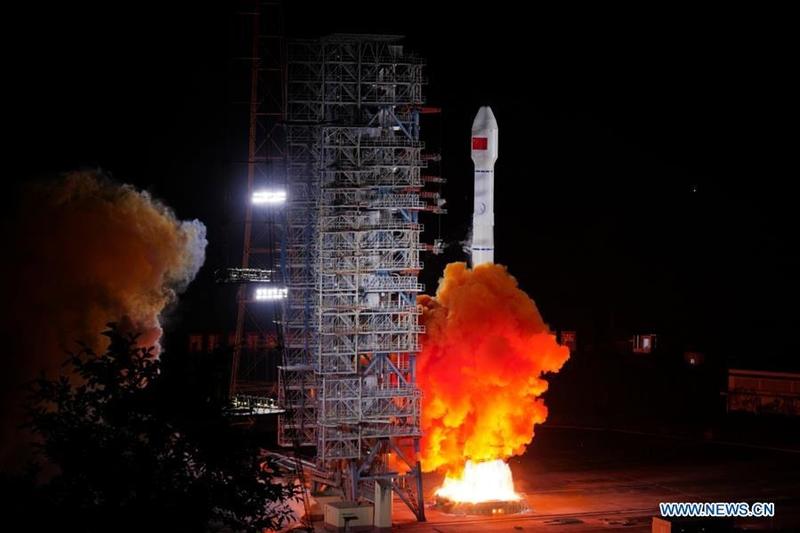Beidou system benefits the world
 0 Comment(s)
0 Comment(s) Print
Print E-mail China.org.cn, June 28, 2020
E-mail China.org.cn, June 28, 2020

China launched the last satellite of the BeiDou Navigation Satellite System (BDS) on June 23, marking the completion of the deployment of its own global navigation system. Fan Chunming, a renowned expert in satellite navigation and dean of the Institute of Satellite Navigation and Spatial Information Engineering of Minjiang University, elaborated on technical characteristics, practical significance, international influence and application suggestions for Beidou navigation satellites in an exclusive interview with Science and Technology Daily.
Science and Technology Daily: Compared with the medium Earth orbit (MEO) systems developed by the United States and Russia, what are the unique "skills" of the BDS system's third-generation network?
Fan Chunming: Compared with the MEO satellite systems developed by the United States and Russia, the BDS system is a medium-to-high orbit hybrid constellation that integrates geostationary Earth orbit (GEO) satellites, inclined geosynchronous orbit (IGSO) satellites and MEO satellites. Although the design makes constellation building more difficult, it enables BDS to have a stronger overall service capability than other systems.
As we all know, the other three global navigation satellite systems — the United States' GPS, Russia's GLONASS and the European Union's Galileo — cannot transmit compensatory information needed for aeronautical satellite navigation using GEO satellites. Additional GEO satellites must be launched to meet the needs of international civil aviation.
However, the BDS system can provide the service of transmitting compensatory information independently through its own GEO satellites. In addition, it also provides short message communication and precise point positioning services.
The third-generation Beidou satellite system is a global navigation satellite system with the most comprehensive functions, and it is capable of providing the largest number of services independently. The system has good scalability and can better absorb various new technologies for deep integration, which is beneficial for improving overall performance and various service functions.
Science and Technology Daily: What is the practical significance of the BDS system's third-generation network?
Fan Chunming: These days, a satellite navigation system has been integrated into every field of the national economy and people's lives. It plays an essential role in various areas, including improving the quality of life, crisis management, ecological and environmental protection, boosting the transportation and logistics sector, and facilitating industrial transformations. In these ways, it has allowed for building a digital China. So, the completion of a third-generation network of the BDS system is of great practical significance to the national economy as well as people's livelihood and security.
Science and Technology Daily: How will the completion of the deployment of the BDS system boost China's international status?
Fan Chunming: A large number of research-backed information has shown that this multi-module application of the Beidou system is greatly beneficial for improving the performance of satellite navigation and positioning.
Studies from other countries have also shown that the construction of the third-generation network of the BDS system, which covers the whole world, will have a significant impact on improving the performance of satellite navigation and positioning worldwide. It can make contributions to the development of digitalization and intelligentization among all walks of life across the world.
For example, the use of high precision positioning on the Internet of Things service platforms is very effective, according to a research by Japan's SoftBank and NTT DOCOMO.
The BDS has been accepted by the International Civil Aviation Organization and the International Maritime Organization, and it has been recognized across the world.
Science and Technology Daily: How will the BDS system help boost building of a digital China, especially in terms of cross-sector applications?
Fan Chunming: From a macroscopic perspective, we should plan the research of satellite navigation application systems and related technologies and services based on the characteristics of satellite navigation systems and industrial application prospects. Only by making good cross-sector applications, can the BDS be fully utilized.
Research on satellite navigation and positioning technology directly targeting cross-sector applications should be encouraged.
Governments need to be able to make cross-sector decisions in terms of planning and budgeting, make overall plans for the direction of industrial development through professional guidance, make good use of fiscal budgets, and encourage private enterprises to play a greater role in the satellite navigation industry.
I believe that the BDS industry will make important contributions to the national industrial transformation and the construction of a digital China under the guidance of a series of macro policies.
Content created in partnership with Science and Technology Daily.






Go to Forum >>0 Comment(s)